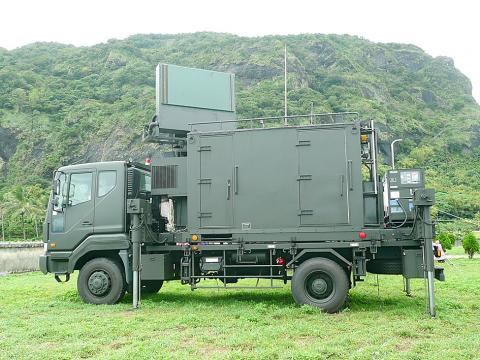As the Chinese People’s Liberation Army Air Force (PLAAF) deploys J-20 stealth fighters in increasing numbers, Taiwan is fielding mobile passive radar systems to defend its airspace against stealth aircraft, a senior Ministry of National Defense official said.
Two radar units — developed by the ministry-affiliated Chungshan Institute of Science and Technology — would be deployed some time this year for operational testing, the officials said on condition of anonymity.
The system would enter mass production in 2020 if the military decides that it meets its operational needs, he said.

Photo copied from the Chungshan Institute of Science and Technology’s Web site
The institute has been working for years to incorporate Western military technological trends in its mobile passive radar system, the official added.
The military’s concept for counter-stealth air defense is comprised of active and passive systems, which would detect, track and lock on to stealth targets at long range, the official said.
The active means would consist of upgraded F-16 warplanes, which have advanced radar systems capable of detecting stealth aircraft, he said, referring to F-16V aircraft and the APG-83 Scalable Agile Beam Radar.
The radar systems would comprise the passive end of the system, the official said.
The mobile units will be remotely linked to active phased array radar systems and “magnify” the radar cross-section of detected objects without emitting radiation, he said.
They are less vulnerable to electronic warfare interference and anti-radiation missile attacks, a fact sheet published by the institute said.
China claims that the J-20, its indigenous stealth strike fighter, performs on a par with the US’ F-22 Raptor, the official said, adding that the jet is likely capable of attacking targets at sea.
The radar systems are a response to the threat posed by Chinese stealth fighters, including its modified Su-35 fighters, which the PLAAF has been coating with radiation-absorbing paint to give them a measure of stealth, he said.
While the J-20 is in limited service, there is no doubt that the PLAAF will increase the size of its stealth fighter fleet and supplement it with other warplanes, which would pose a significant threat to Taiwan’s air defense, he said.
“These developments will erode the detection range of our advanced warning radar systems or even lead to the complete loss of advanced warning and quick reaction capabilities,” he said. “The military must plan for and deploy countermeasures to preempt them.”
The PLAAF on Friday last week dispatched formations of Su-35 fighters and H-6K bombers to fly around Taiwan, the first time that the former was sent on such a patrol.
The Chinese military claims that the J-20 has been deployed in air combat drills at sea.

A magnitude 7.0 earthquake struck off Yilan at 11:05pm yesterday, the Central Weather Administration (CWA) said. The epicenter was located at sea, about 32.3km east of Yilan County Hall, at a depth of 72.8km, CWA data showed There were no immediate reports of damage. The intensity of the quake, which gauges the actual effect of a seismic event, measured 4 in Yilan County area on Taiwan’s seven-tier intensity scale, the data showed. It measured 4 in other parts of eastern, northern and central Taiwan as well as Tainan, and 3 in Kaohsiung and Pingtung County, and 2 in Lienchiang and Penghu counties and 1

FOREIGN INTERFERENCE: Beijing would likely intensify public opinion warfare in next year’s local elections to prevent Lai from getting re-elected, the ‘Yomiuri Shimbun’ said Internal documents from a Chinese artificial intelligence (AI) company indicated that China has been using the technology to intervene in foreign elections, including propaganda targeting Taiwan’s local elections next year and presidential elections in 2028, a Japanese newspaper reported yesterday. The Institute of National Security of Vanderbilt University obtained nearly 400 pages of documents from GoLaxy, a company with ties to the Chinese government, and found evidence that it had apparently deployed sophisticated, AI-driven propaganda campaigns in Hong Kong and Taiwan to shape public opinion, the Yomiuri Shimbun reported. GoLaxy provides insights, situation analysis and public opinion-shaping technology by conducting network surveillance

‘POLITICAL GAME’: DPP lawmakers said the motion would not meet the legislative threshold needed, and accused the KMT and the TPP of trivializing the Constitution The Legislative Yuan yesterday approved a motion to initiate impeachment proceedings against President William Lai (賴清德), saying he had undermined Taiwan’s constitutional order and democracy. The motion was approved 61-50 by lawmakers from the main opposition Chinese Nationalist Party (KMT) and the smaller Taiwan People’s Party (TPP), who together hold a legislative majority. Under the motion, a roll call vote for impeachment would be held on May 19 next year, after various hearings are held and Lai is given the chance to defend himself. The move came after Lai on Monday last week did not promulgate an amendment passed by the legislature that

AFTERMATH: The Taipei City Government said it received 39 minor incident reports including gas leaks, water leaks and outages, and a damaged traffic signal A magnitude 7.0 earthquake struck off Taiwan’s northeastern coast late on Saturday, producing only two major aftershocks as of yesterday noon, the Central Weather Administration (CWA) said. The limited aftershocks contrast with last year’s major earthquake in Hualien County, as Saturday’s earthquake occurred at a greater depth in a subduction zone. Saturday’s earthquake struck at 11:05pm, with its hypocenter about 32.3km east of Yilan County Hall, at a depth of 72.8km. Shaking was felt in 17 administrative regions north of Tainan and in eastern Taiwan, reaching intensity level 4 on Taiwan’s seven-tier seismic scale, the CWA said. In Hualien, the